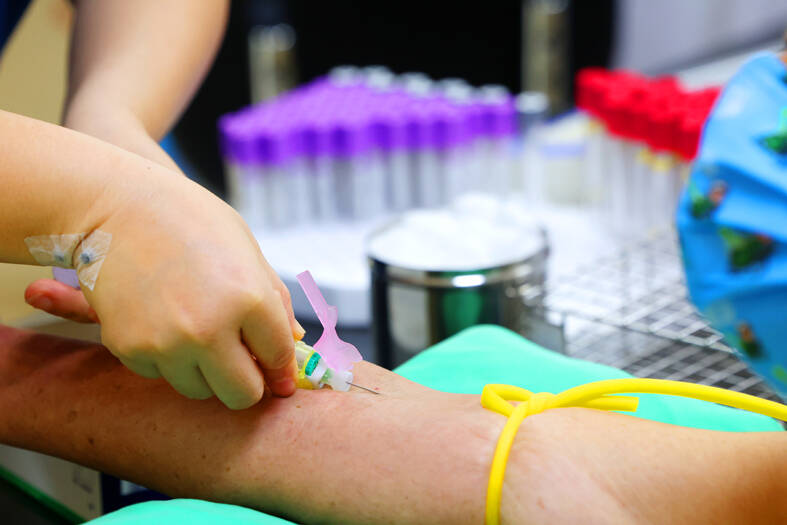The Health Promotion Administration yesterday said its Nutrition and Health Survey in Taiwan (NAHSIT) interviewers would acquire the consent of participants before performing checkups, and they would not take blood samples in the participants’ home, after a woman complained on Facebook about interviewers’ alleged conduct.
A woman on Thursday shared a letter on Facebook allegedly from Academia Sinica’s NAHSIT team, commissioned by the agency to perform the survey.
About three months ago, an Academia Sinica researcher visited her home, holding an official document and asked to take blood samples of her child, the woman wrote.

Photo: CNA
The researcher had the child’s personal information, so she questioned the authenticity and safety of the survey, she added.
When she refused to let her child’s blood be drawn, the interviewer said the borough warden and local public health center had been informed and asked why she refused, she wrote.
The agency on Friday said the survey is conducted according to the Nutrition and Healthy Diet Promotion Act (營養及健康飲食促進法), and it commissions an academic institute every four years, with Academia Sinica conducting it from 2021 to last year.
The Executive Yuan’s Directorate-General of Budget, Accounting and Statistics, and an institutional review board (IRB) approved the survey, it said, adding that professionally trained interviewers would acquire the participants’ signature of consent before conducting surveys and checkups, and that personal data are stored confidentially.
Local media on Friday last week reported that an official, responding to the incident, said that participants “might as well consider it a free health exam, as it is fairly expensive to get at a hospital.”
The Human Subject Protection Association in Taiwan on Saturday issued a statement condemning the Health Promotion Administration for allegedly misleading people by mentioning a “free health exam.”
When people have doubts about participating in the survey, the agency should clarify whether the survey had been conducted strictly according to an IRB-approved protocol and respect people’s right to reject, rather than misleading them and trying to convince them to get a “free health exam,” the association said.
The Health Promotion Administration on Sunday apologized for the case causing distress to people, saying that it would reflect and improve its operational procedures, as well as strengthen its interviewers’ capability to explain the survey and protect interviewees’ rights.
The agency’s Surveillance, Research and Health Education Division Director Lin Yi-ching (林宜靜) yesterday said the NAHSIT interviewers would certainly obtain participants’ signature of consent before conducting a survey and arranging a checkup for them.
Checkups, including physical examination and blood tests, would be conducted by healthcare professionals, so they would not be performed at participants’ homes, Lin said.
With scams becoming rampant over the past few years, it is a good thing that people have become more vigilant, she said.
However, it also creates more obstacles for governmental surveys, as rejection rates by targeted participants have been increasing consistently, she said.
The agency would continue to promote the NAHSIT and explain it to people, and hopefully more people would understand the survey’s importance and be willing to participate in it, she added.

‘DENIAL DEFENSE’: The US would increase its military presence with uncrewed ships, and submarines, while boosting defense in the Indo-Pacific, a Pete Hegseth memo said The US is reorienting its military strategy to focus primarily on deterring a potential Chinese invasion of Taiwan, a memo signed by US Secretary of Defense Pete Hegseth showed. The memo also called on Taiwan to increase its defense spending. The document, known as the “Interim National Defense Strategic Guidance,” was distributed this month and detailed the national defense plans of US President Donald Trump’s administration, an article in the Washington Post said on Saturday. It outlines how the US can prepare for a potential war with China and defend itself from threats in the “near abroad,” including Greenland and the Panama

The High Prosecutors’ Office yesterday withdrew an appeal against the acquittal of a former bank manager 22 years after his death, marking Taiwan’s first instance of prosecutors rendering posthumous justice to a wrongfully convicted defendant. Chu Ching-en (諸慶恩) — formerly a manager at the Taipei branch of BNP Paribas — was in 1999 accused by Weng Mao-chung (翁茂鍾), then-president of Chia Her Industrial Co, of forging a request for a fixed deposit of US$10 million by I-Hwa Industrial Co, a subsidiary of Chia Her, which was used as collateral. Chu was ruled not guilty in the first trial, but was found guilty

A wild live dugong was found in Taiwan for the first time in 88 years, after it was accidentally caught by a fisher’s net on Tuesday in Yilan County’s Fenniaolin (粉鳥林). This is the first sighting of the species in Taiwan since 1937, having already been considered “extinct” in the country and considered as “vulnerable” by the International Union for Conservation of Nature. A fisher surnamed Chen (陳) went to Fenniaolin to collect the fish in his netting, but instead caught a 3m long, 500kg dugong. The fisher released the animal back into the wild, not realizing it was an endangered species at

DEADLOCK: As the commission is unable to forum a quorum to review license renewal applications, the channel operators are not at fault and can air past their license date The National Communications Commission (NCC) yesterday said that the Public Television Service (PTS) and 36 other television and radio broadcasters could continue airing, despite the commission’s inability to meet a quorum to review their license renewal applications. The licenses of PTS and the other channels are set to expire between this month and June. The National Communications Commission Organization Act (國家通訊傳播委員會組織法) stipulates that the commission must meet the mandated quorum of four to hold a valid meeting. The seven-member commission currently has only three commissioners. “We have informed the channel operators of the progress we have made in reviewing their license renewal applications, and